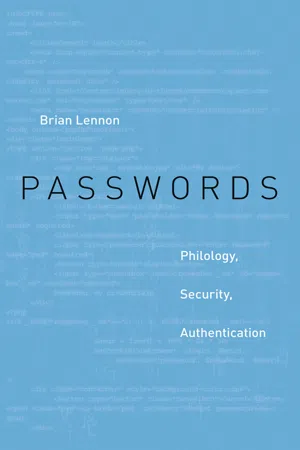
- English
- PDF
- Available on iOS & Android
About this book
Cryptology, the mathematical and technical science of ciphers and codes, and philology, the humanistic study of natural or human languages, are typically understood as separate domains of activity. But Brian Lennon contends that these two domains, both concerned with authentication of text, should be viewed as contiguous. He argues that computing's humanistic applications are as historically important as its mathematical and technical ones. What is more, these humanistic uses, no less than cryptological ones, are marked and constrained by the priorities of security and military institutions devoted to fighting wars and decoding intelligence.
Lennon's history encompasses the first documented techniques for the statistical analysis of text, early experiments in mechanized literary analysis, electromechanical and electronic code-breaking and machine translation, early literary data processing, the computational philology of late twentieth-century humanities computing, and early twenty-first-century digital humanities. Throughout, Passwords makes clear the continuity between cryptology and philology, showing how the same practices flourish in literary study and in conditions of war.
Lennon emphasizes the convergence of cryptology and philology in the modern digital password. Like philologists, hackers use computational methods to break open the secrets coded in text. One of their preferred tools is the dictionary, that preeminent product of the philologist's scholarly labor, which supplies the raw material for computational processing of natural language. Thus does the historic overlap of cryptology and philology persist in an artifact of computing—passwords—that many of us use every day.
Tools to learn more effectively

Saving Books

Keyword Search

Annotating Text

Listen to it instead
Information
Table of contents
- Cover
- Title Page
- Copyright
- Contents
- Preface
- 1. Passwords: Philology, Security, Authentication
- 2. Cryptophilology, I
- 3. Machine Translation: A Tale of Two Cultures
- 4. Cryptophilology, II
- 5. The Digital Humanities and National Security
- Notes
- Acknowledgments
- Index
Frequently asked questions
- Essential is ideal for learners and professionals who enjoy exploring a wide range of subjects. Access the Essential Library with 800,000+ trusted titles and best-sellers across business, personal growth, and the humanities. Includes unlimited reading time and Standard Read Aloud voice.
- Complete: Perfect for advanced learners and researchers needing full, unrestricted access. Unlock 1.4M+ books across hundreds of subjects, including academic and specialized titles. The Complete Plan also includes advanced features like Premium Read Aloud and Research Assistant.
Please note we cannot support devices running on iOS 13 and Android 7 or earlier. Learn more about using the app